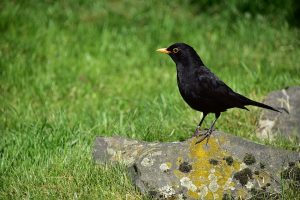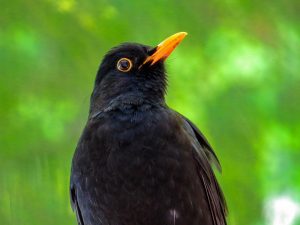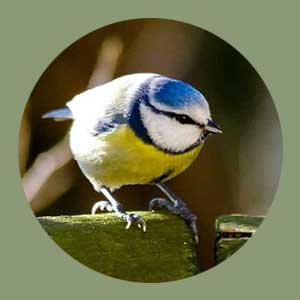I never struggle for topics to write about my beloved birds, but often the strangest things trigger an idea, this is no exception.
Absentmindedly singing along to Sinatra’s rendition of Bye Bye Blackbird sent my train of thought to one of my larger garden visitors, and making me think are blackbirds in decline?

I always find it fascinating finding out if a population is in danger; here are my findings.
Happily, the blackbird population is currently stable and causing no concern. However, there have been periods of decline in recent years, mostly due to poor food availability and changes in agricultural practices.
Table of Contents
Blackbirds in Big Cities
Sightings of blackbirds in big cities such as London are getting fewer. Results from the Great British Birdwatch and the Make Your Nature Count surveys suggest that inner-city blackbirds numbers have declined by at least 15% when compared with results from a decade ago.
This might be sad for city-dwelling bird lovers, but it isn’t a reflection of the whole country.
Plentiful natural food keeps the blackbird population buoyant, and when they can’t find caterpillars, insects, and spiders from woodland, they are very confidant looking for food in our gardens.
Blackbirds are ground feeders, don’t be surprised to see them foraging around your lawn on the hunt for worms and insects.
What caused previous blackbird declines
Although their numbers are steady at the moment, it is useful to know what caused previous blackbird populations to decrease, in an attempt to prevent it from happening again.
Changes in agriculture
The blackbird is found all over the UK, other than the high lands of Scotland. Their preferred habitat is in woodland, close to farmland where food is in abundance.
Farmers change their practices to maximise the potential of their land and to prevent the birds from literally eating their profits.

- Hedgerows are removed to expand the plantable area. This not only loses nesting sites but also the natural habitats of many insects, the blackbird’s primary food source.
- Improved drainage techniques keep the land dryer. Blackbirds prefer damp soil as it is more hospitable to many insects.
- Farmers rarely allow land to lie fallow. As soon as one crop is harvested, the next is planted. Large empty fields were a feeding ground for hungry blackbirds looking to feast on forgotten crops.
- More fertilisers and chemicals used in farming repel the birds.
- Farmers have got wise to birds stealing from their grain stores and use much more secure storage sheds.
- Old farm buildings that once housed hundreds of birds and their broods have been ripped down, leaving no interesting nooks and crannies in which they can build their nests.
Anything that reduces the amount of food available to the blackbird is a contributing factor in their possible future decline.
Final thoughts…
Thanks for reading ‘Are Blackbirds in Decline’. Hopefully, now we will all spare a few mealworms or suet pellets beneath cover on the ground in our gardens, to ensure their population remains healthy.
With 6,000,000 breeding pairs of European blackbirds in Britain, it is safe to say that their numbers are stable, for now.
